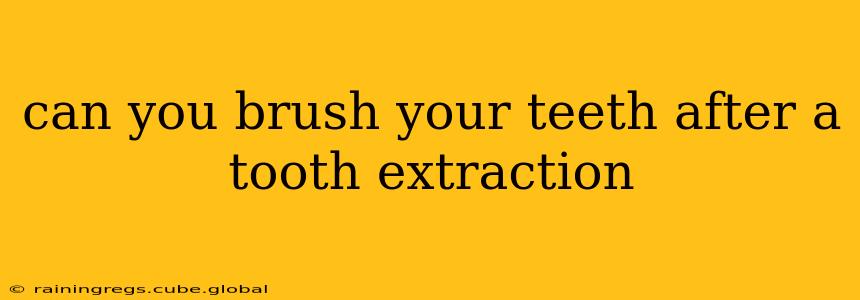Can You Brush Your Teeth After a Tooth Extraction?
The short answer is: yes, but with caution. Brushing your teeth after a tooth extraction is crucial for maintaining good oral hygiene and preventing infection, but you need to do it gently and carefully to avoid disturbing the extraction site. The way you brush, and when you start brushing again, are both very important.
When Can I Start Brushing After a Tooth Extraction?
This is a common question, and the answer depends on your specific situation. Generally, your dentist or oral surgeon will provide post-operative instructions. However, a good rule of thumb is to wait at least 24 hours before resuming normal brushing. This allows the blood clot to form properly, which is essential for healing. Touching the extraction site too soon can dislodge the clot, leading to a painful and potentially serious condition called dry socket.
How Should I Brush My Teeth After a Tooth Extraction?
Even after the initial 24-hour waiting period, you'll need to modify your brushing technique:
- Gentle Brushing: Use a soft-bristled toothbrush and brush gently around the extraction site. Avoid any direct pressure or scrubbing on the area.
- Avoid the Extraction Site Directly: Focus your brushing efforts on the teeth opposite the extraction site and the other areas of your mouth. Gently brush around the extraction site as much as possible without touching it.
- Rinse Carefully: Instead of vigorous rinsing, gently swish a saltwater rinse around your mouth to clean the area without disturbing the blood clot. Your dentist might recommend a specific mouthwash.
What if I Have Pain or Bleeding After Brushing?
If you experience pain or significant bleeding after brushing, stop immediately and contact your dentist or oral surgeon. This could indicate a problem, and prompt medical attention is essential.
What Happens if I Don't Brush After a Tooth Extraction?
Neglecting oral hygiene after an extraction can significantly increase your risk of infection. Food particles and bacteria can accumulate in the extraction site, leading to complications like dry socket or infection. This can prolong healing and lead to more significant discomfort.
What Type of Toothbrush Should I Use?
As mentioned above, a soft-bristled toothbrush is highly recommended. The soft bristles will be gentler on your gums and the healing extraction site. Avoid hard-bristled brushes, as they can be too abrasive.
Are there other things I should do to promote healing after a tooth extraction?
Yes, besides careful brushing:
- Follow your dentist's instructions precisely. They'll provide personalized advice based on your individual case.
- Eat soft foods. Avoid chewing directly on the extraction site.
- Apply ice packs as directed. This helps reduce swelling.
- Take prescribed pain medication. This can help manage any discomfort.
Remember, maintaining good oral hygiene after a tooth extraction is crucial for a successful healing process. By following these tips and carefully following your dentist’s instructions, you can minimize discomfort and promote healing. If you have any concerns or questions, don't hesitate to contact your dentist or oral surgeon. They are your best resource for personalized advice and care.
